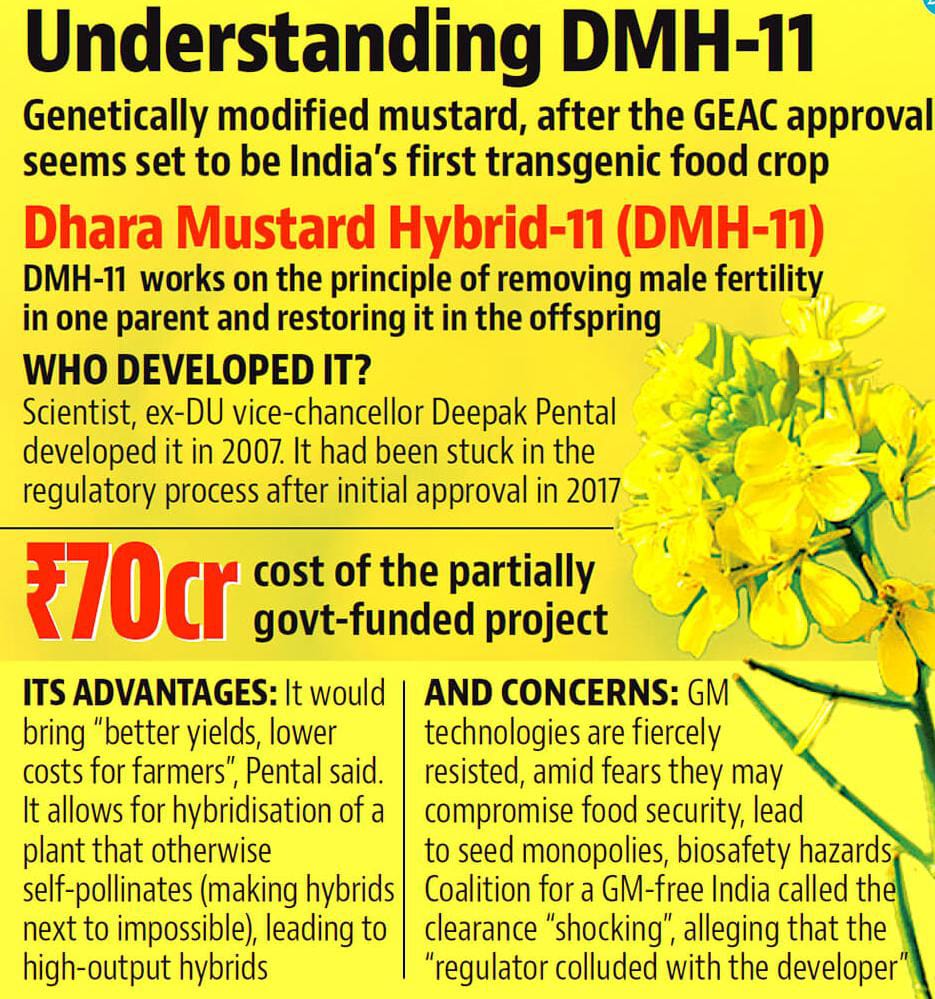Ahmedabad
(Head Office)Address : 506, 3rd EYE THREE (III), Opp. Induben Khakhrawala, Girish Cold Drink Cross Road, CG Road, Navrangpura, Ahmedabad, 380009.
Mobile : 8469231587 / 9586028957
Telephone : 079-40098991
E-mail: dics.upsc@gmail.com

A GM Crop decision that cuts mustard
News: The environmental release of GM mustard DMH-11 marks a new era in self-reliance and sustainability in agriculture in India.
Context:
• According to the Global Food Security and Nutrition Report, 2019, it is difficult to achieve the ‘Zero Hunger’ target by 2030.
What are GM Crops?
• GM foods are derived from plants whose genes are artificially modified.
• By inserting genetic material from another organism, in order to give it a new property, such as Increased yield, to provide tolerance to herbicide, resistance to disease or drought and to improve its nutritional value.
• India has so far approved commercial cultivation of only one GM crop, Bt cotton.
What is the need for Genetic improvement in Crop production?
• To achieve food and nutritional security while facing the wrath of climate change, there is an urge to accelerate genetic improvement in crops.
• Superior crop varieties and hybrids are essential for higher yields, adaptability across diverse environments, and reduced resource inputs.
• While The Green Revolution of the 1960s-70s helped significantly increase food production, but new biotech/GM crops are required for climate resilience and nutrient-rich food production.
What is the importance of Mustard for India?
• India faces a major deficit in edible oils - 60% of its demand is met by imports. Mustard is one of the most important edible oil crops in India. However, its per hectare yield is very low when compared to the global average.
• Increasing the productivity of mustard in the country is vital for the economic well-being of farmers and selfsufficiency in edible oil production.
• Genetic engineering efforts, like the GM mustard hybrid DMH-11, aim to enhance domestic edible oil production and farmer incomes.
Way Forward
• Focus on accelerating the pace of improving crops genetically.
• We need superior crop varieties and hybrids to increase food production and become self-reliant.
• Cultivation of GM mustard hybrids developed indigenously could help enhance farmers’ income, reduce the oil-import burden and help achieve much-needed self-reliance in edible oil production.

Address : 506, 3rd EYE THREE (III), Opp. Induben Khakhrawala, Girish Cold Drink Cross Road, CG Road, Navrangpura, Ahmedabad, 380009.
Mobile : 8469231587 / 9586028957
Telephone : 079-40098991
E-mail: dics.upsc@gmail.com
Address: A-306, The Landmark, Urjanagar-1, Opp. Spicy Street, Kudasan – Por Road, Kudasan, Gandhinagar – 382421
Mobile : 9723832444 / 9723932444
E-mail: dics.gnagar@gmail.com
Address: 2nd Floor, 9 Shivali Society, L&T Circle, opp. Ratri Bazar, Karelibaugh, Vadodara, 390018
Mobile : 9725692037 / 9725692054
E-mail: dics.vadodara@gmail.com
Address: 403, Raj Victoria, Opp. Pal Walkway, Near Galaxy Circle, Pal, Surat-394510
Mobile : 8401031583 / 8401031587
E-mail: dics.surat@gmail.com
Address: 303,305 K 158 Complex Above Magson, Sindhubhavan Road Ahmedabad-380059
Mobile : 9974751177 / 8469231587
E-mail: dicssbr@gmail.com
Address: 57/17, 2nd Floor, Old Rajinder Nagar Market, Bada Bazaar Marg, Delhi-60
Mobile : 9104830862 / 9104830865
E-mail: dics.newdelhi@gmail.com